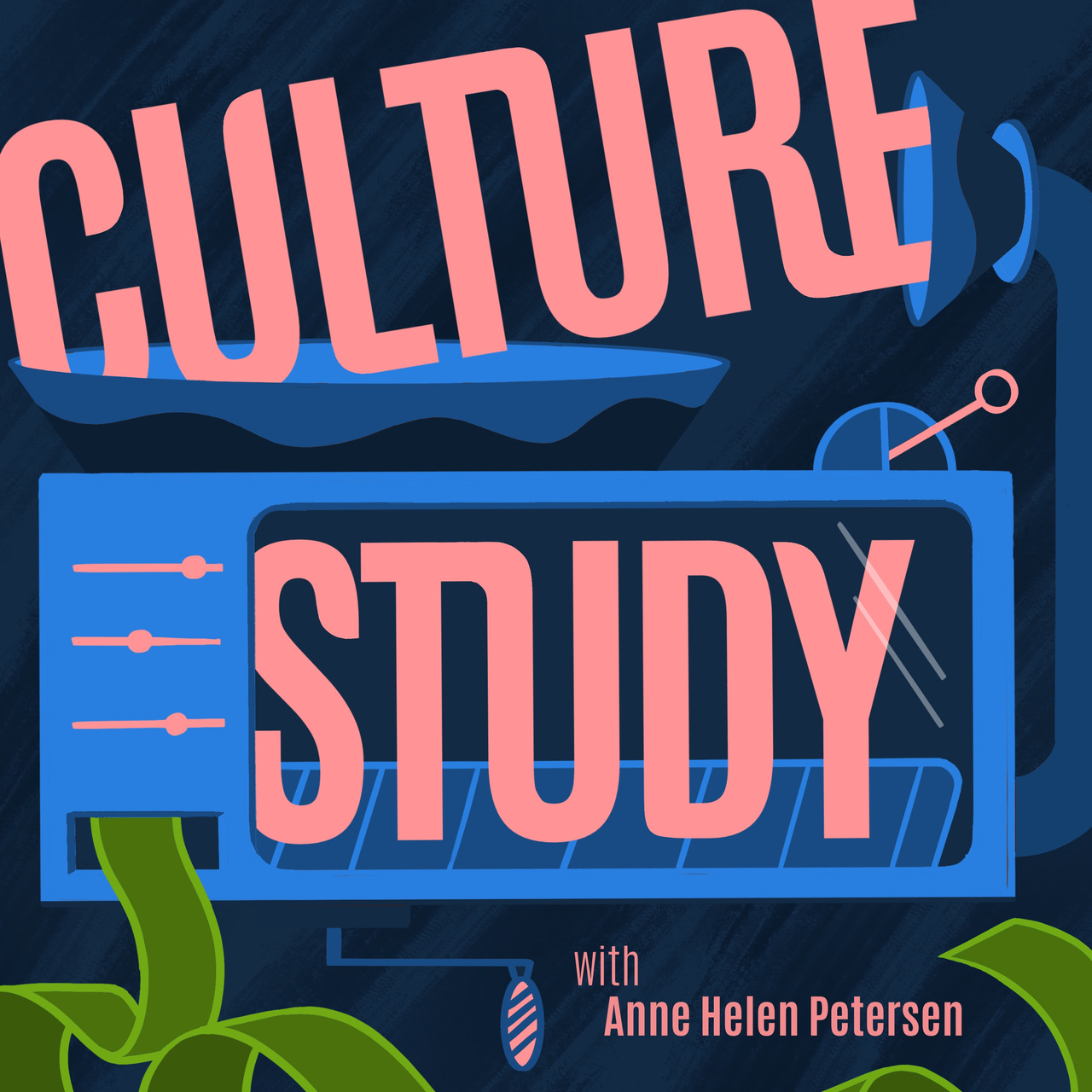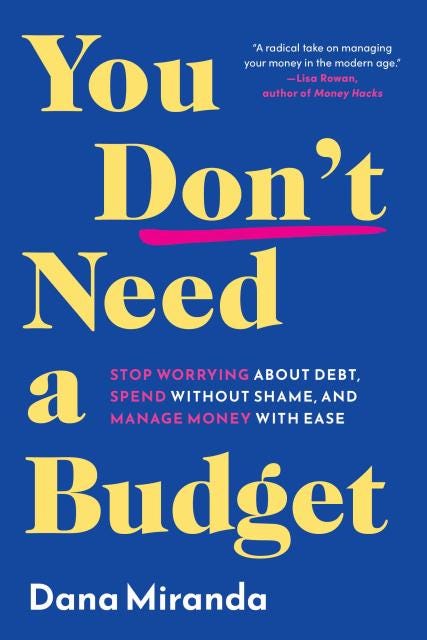The Case Against Budget Culture
"Most of us aren’t greedy people, but the way budget culture teaches us to think about money is rooted in greed."
This week’s episode of
is all about the changes in thrifting, particularly over the last twenty years — and we need your help trying to figure out a thrifting mystery. Listen here or click the magic link to listen wherever you listen to your podcasts.Also: scroll to the bottom for a specific call-out re: money advice for an upcoming episode with Dana Miranda!
A lot of us are in the lifelong process of unlearning — various ideologies about how the world works. That ideology might be connected to fatphobia and diet culture. It might be about Christianity and patriarchy, or workism and individualism. It might be about whiteness, or American supremacy, or the carceral system, or the unquestioned valorization of home ownership.
My hope is that Culture Study is one of the places where you can begin (or continue) to interrogate the status quo — and unpack the stories we tell ourselves about why things are the way they are. Of course, this sort of work reliably brings out a lot of heavy shit: defensiveness, what-about-ism, shame, anger. Which makes sense, since we’re questioning and revising foundational aspects of who we are, how we behave, what we value, and how we organize the world around us. It can feel profoundly destablizing. But it’s also an essential component of change.
Today, we’re talking about budget culture and norms of capital accumulation with Dana Miranda, who consistently challenges me to rethink my established “best practices” when it comes to money. She first wrote about Budget Culture and the Dave Ramseyifcation of Budget Culture here on Culture Study back in 2022, which is a fantastic starting point if you want to get to know what anti-capitalistic finance thinking actually looks like. I also strongly recommend her newsletter, Healthy Rich, and her new book, You Don’t Need a Budget, which serves as the starting point for our discussion below.
This one’s gonna bring up some emotions, because money talk always brings up emotions. But no matter your current thinking about money, budgeting, savings, accumulation, charity, debt, all of it — I hope you approach these arguments with openness, and a willingness to rethink some of the established thinking about how we relate to money and its place in our lives.
You can subscribe to Healthy Rich here — and buy You Don’t Need a Budget here.
I thought we should start with why I’d do a Q&A with you instead of the thousands of other financial advice writers out there — what distinguishes your thinking and style when it comes to money?
The personal finance industry tends to be occupied with helping people get and keep (hoard) more money, without ever asking whether that’s a useful goal. I’m much more interested in investigating our cultural relationship with money and understanding the impacts of that one-size-fits-all goal.
This conversation makes sense here, because I think less about tactical steps to achieve elusive financial goals and much more about how our culture of money affects the decisions we make about our long-term paths and day-to-day lives. I call the dominant approach budget culture, because it’s rooted in the restriction and shame inherent in budgeting behavior. But, just like diet culture, it’s not about the act of budgeting; it’s about the cultural posture that makes budgeting seem like useful and necessary behavior.
I’m trained as a financial educator and work as a service journalist, so I do like to talk about the nuts and bolts of financial systems and products, but I stop short of telling readers what they “should” do, what’s “right” or what’s “best.” Financial media and education equate “financial wellness” with making the most money and “financial literacy” with knowing how to hold onto it. There’s an inherent greed in that approach that doesn’t align with what most people actually want, and the realities of our economy make those goals unreachable for most people. That sets us up for constant tension between what we’re told are the “right” things to do with our money, what’s possible given our socioeconomic realities, and what we need to live the lives we want.
My work is focused on helping people recognize that tension and question the premise of budget culture, figuring out how to live with ease and joy in spite of it, and — ultimately, hopefully! — rooting out this one-track thinking and starting a broader, more nuanced conversation about money in our culture.
I next want to address the knee-jerk reaction that I see whenever someone starts critiquing budget culture — namely, that it just works, and anyone who doesn’t want to live by a budget is lazy, entitled, or doesn’t understand how money works. Even when you lay out the ways budget culture fucks up people’s relationship with money and just doesn’t work, there’s still this overwhelming feeling that living without a budget is akin to driving without a seatbelt: reckless, irresponsible, juvenile, wrong.
I have my theories about how American understandings of work and the fetishism of restraint intersect with this thinking, but I’d love to hear you unpack it more. Where does the veneration of budgeting come from? What’s the value in de-naturalizing it?
That overarching American reliance on individual responsibility absolutely plays a role here, just like it does for our approach to everything — eating, parenting, relationships, work, activism, whatever. Individualism lays a foundation for our approach to money that relies on discipline and restraint and ignores our inherent understanding of ourselves. It sets you up to look for what you’re doing wrong instead of what’s wrong with the culture around you. It keeps you from asking questions and talking about financial struggles, so you feel isolated and ashamed of them.
Budget culture steps into this environment, defines a “right” set of goals, creates a set of rules, and tells you you can reach those goals if you follow those rules. Just like the promises of fad diets, the latest relationship advice, or the one bad company you can avoid to stop from destroying the planet, there’s an enormous appeal to finding the one right way to do anything. It can briefly quiet the noise of all the uncertainty our messy culture causes.
What I hear from people who insist on budgeting is that it makes them feel in control. A budget gives you a simple set of rules that promises to address the huge problems of capitalism, inequality and financial insecurity in your life, and you finally feel like you know the next step to take. In the book, I quote Amanda Montell, who explains this perfectly in Cultish: “Modern cultish groups feel comforting in part because they help alleviate the anxious mayhem of living in a world that presents almost too many possibilities for who to be.”
But budgeting and budget culture are actually ways of being controlled through self-monitoring, the judgment from people around you and the apps you use to measure your behavior. Offloading your financial decision-making to a budget and a set of economic goals you didn’t choose undercuts your ability to intuitively decide how to work and use money to live the life you want.
Emerging research on budgeting makes it clear this restrictive approach doesn’t work, but we could have seen that coming from a century of research on diet culture: Restriction is unsustainable personally, and culturally, normalizing this approach causes us to judge others and shame ourselves for not living up to an impossible standard.
Decreasing money’s hold over your life is foundational to your work…..and, at least theoretically, the easiest way to care/worry/obsess less about money is to just have more of it. (I don’t think this is necessarily true in all cases, but I do think it’s very true for anyone straddling the line between precarity and stability). Some financial thinkers advise accumulating money in pretty ruthless, capitalistic, individualistic, and/or soul-crushing ways — so that you can then live the money-worry-free lifestyle you envision.
Your work takes a different perspective towards accumulation — one that isn’t just limited to actual money, either. Can you talk a bit about how you think about accumulation, about the need for both financial and community investment, and how you think about movements like, say, F.I.R.E.? I know that’s a lot!!!
F.I.R.E., oof. I’ve written before about how financial independence is the worst of budget culture. The movement taps into an understandable desire to stop trading labor for what it takes to live a life — i.e. “earning a living,” which is a concept I try to de-naturalize in the book. But it takes the most individualistic approach possible to solving that problem!
But, really, F.I.R.E. is just the most extreme version of our accumulation-based approach to security, especially in the U.S. We have no social safety nets; we’re trained to believe it’s normal that we have to build our own, individualized nets by hoarding wealth. That wealth hoarding is incentivized through policies that create products like health savings accounts and retirement accounts — instead of addressing the urgent need for universal health care and well-funded Social Security programs, for example.
Accumulation isn’t necessary to gain financial freedom. That freedom is about making decisions independent of how they could help you earn or keep money. That experience isn’t available to most people through wealth accumulation, but it can be through community and government resources, as well as rethinking your relationship to debt. Seeking financial independence through wealth requires growing your income and being disciplined and strategic about how to use it to build assets (i.e. earn money, buy property, invest). That’s basically what financial education under budget culture teaches. But income isn’t the only resource available to you.
I also consider community, government and debt resources as ways to ease financial stress and live your life without money weighing in. Bringing debt into that equation means releasing budget culture’s moralizing about debt and embracing products like credit cards and loans as ways to expand your resources. Bringing government into the equation means understanding the public resources that are already available, and working to expand those resources and who can access them. Bringing community into the equation means recognizing the wealth around you, including money available through friends or family, but also non-monetary resources like a friend with a truck you can borrow or neighbors who babysit for free.
Community resources are also the nonprofit and mutual-aid services in our communities (online or geographic). Recognizing these resources as morally neutral alongside earned income can free time and money to live your life, which is ultimately what we’re trying to do through wealth accumulation.
I loved the chapter in the book on giving money away — and not just to organizations and 501c3s, but directly to people who need it. How does budget culture frame that sort of giving as “foolish,” and how can people move away from that line of thinking?
Budget culture guides our financial decisions from a place of greed, rather than generosity. Most of us aren’t greedy people, but the way budget culture teaches us to think about money is rooted in greed. Every conventional rule about money management is biased toward the belief that wealth accumulation is necessary, so financial advice is designed to teach us to hoard money and feel like a chump giving it away.
With everything — but money in particular — our culture trains us to believe we never have what we need, and there’s not enough to go around. Our culture’s focus on individuality and individual responsibility makes it hard to be generous and easy to ignore someone else’s need. Advice for “responsible” money management is focused on hoarding what you can, worrying about finding the next dollar and taking precautions to avoid losing everything you have.
There’s no room for generosity in that mindset, because it convinces you that you inevitably get less when someone else gets more. You can begin to break down that belief by first understanding that nothing is truly yours to begin with. Whatever you own isn’t truly yours; it’s just in your care for now. Money is a tool to shape the life and world around you. When you hold it in your hands, you hold the responsibility to contribute to that world in a life-giving way. When you see money as a communal and transient resource, you don’t have to fear scarcity when you give it away or use it to benefit someone else. Their gain isn’t your loss, because there was never a difference between “your” money and “their” money in the first place.
Nonprofit charities are the easiest path we have to giving in our culture, and they’re important, but they can be incredibly problematic. Giving money directly to individuals is the most effective way to help them meet their needs. We can do that through direct, personal gifts, but also in more strategic ways through governments. I encourage readers to think of taxes as an opportunity for generosity (and a way of paying for civilization), because governments can be the most effective vehicles for equitable wealth distribution if we allow them to function that way.
Your post-election newsletter has stuck with me these past months — because I think a lot of us are thinking about how we can protect ourselves and our communities from the material and psychological effects of a Trump administration. Money feels at once absolutely essential and fundamentally unreliable. How are you thinking about the utility of money and wealth right now — and how does it fit into larger understandings of community care?
Trump’s election throws us into a period of uncertainty, because he’s unpredictable and unreliable. We can guess at what might happen during his final term based on what he promised during the campaign, but we know from his first term that he probably won’t deliver on those promises and will instead deliver a daily onslaught of surprises that shift laws, move markets and harm vulnerable people. We can be almost certain that Trump with a Republican-controlled legislature and judiciary won’t move us any closer toward my utopian vision of a government that equitably distributes resources and builds a rock-solid social safety net. So individual wealth is going to be very important over the next four years.
But I don’t think we have to revert to an accumulation mindset to survive. We can adopt that broader understanding of financial freedom and lean on community and debt resources to get through the next four years (and beyond). You can bolster your individual resources by diversifying your income and expanding your access to credit, yes. But you can also bolster community resources by connecting with affirming and supportive communities in your area and online. Incorporating community care into your understanding of the resources available to you (and the resources you give) creates a base of support that can’t be easily eroded by job loss, market dips, grocery prices or other financial factors.
When I asked people for questions about preparing their finances for the Trump regime, a lot of people asked for investment advice. That screams “budget culture” to me — it’s reverting to individual responsibility in the face of systemic chaos and grasping for a sense of control to quiet your fears. Truly, there’s not a practical way to prepare for the absurdity of a Trump presidency. But you can survive whatever happens financially by adjusting your relationship with money and letting go of its hold over your life. ●
You can subscribe to Healthy Rich here — and buy You Don’t Need a Budget here.
I know Dana and I would both love to hear your thoughts on this interview, budget culture, what budget “rules” you struggle to let go of, etc. etc. Just be mindful of the normal Culture Study comment guidelines (don’t be assholes) and let’s keep this one of the good places on the internet, *even* when we talk about money.
And finally: we’re having Dana on
to specifically address various “best practices” and common advice when it comes to money. What advice do you hear ALL THE TIME and find slightly dubious? What parts of budget culture make you itchy? Submit your questions on this very straightforward form and we’ll do our best to unpack them.If you liked that interview - if it made you think, if you sent it to friends, if you want to keep the paywall off it and future interviews like it - consider becoming a paid subscriber:
Paid subscribers get access to all the weekly threads, all the weekly recs and links, every Just Trust Me - plus the knowledge that they’re making work like this sustainable. You make this newsletter possible, and I’m so grateful for you!







Normalize giving your friends money in times of crisis!!! Even if you have to get sneaky and take out cash and slip it in their mailbox!
Woke up to 62 comments and just want to say I love how engaged and thoughtful this conversation is - particularly amongst people whose opinions differ. I’m still working out how I feel about these concepts, too; I think a lot of us are. Reading through comments like these (and figuring out how to articulate your own comment) is so useful, and I’m so grateful for this discussion!